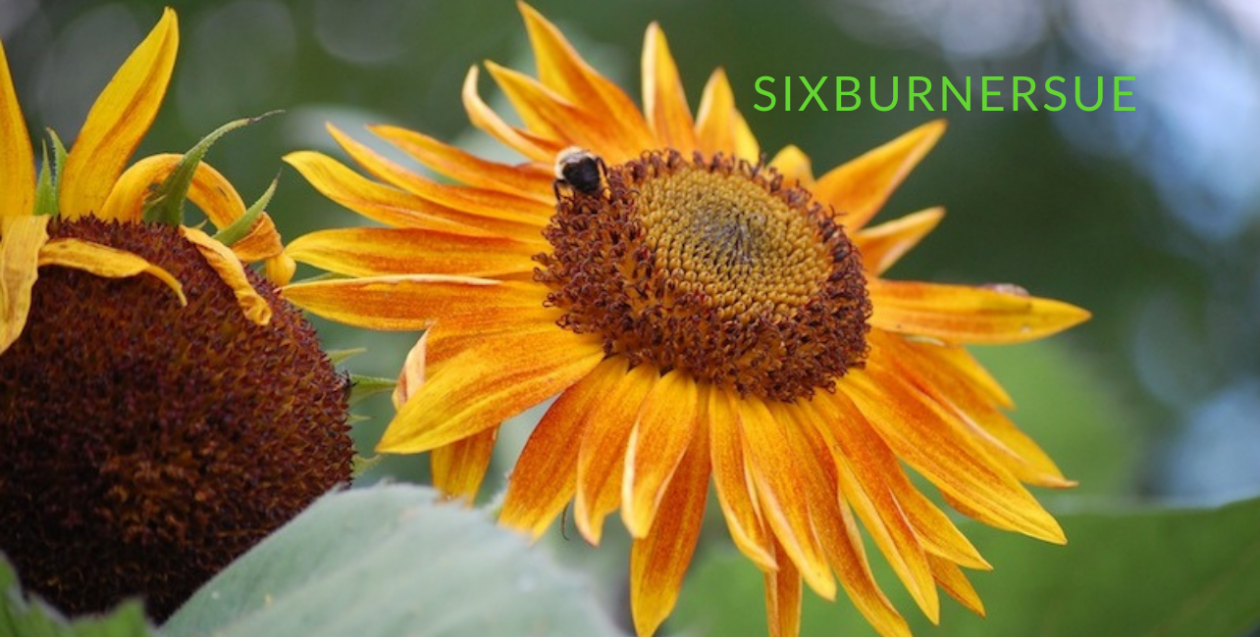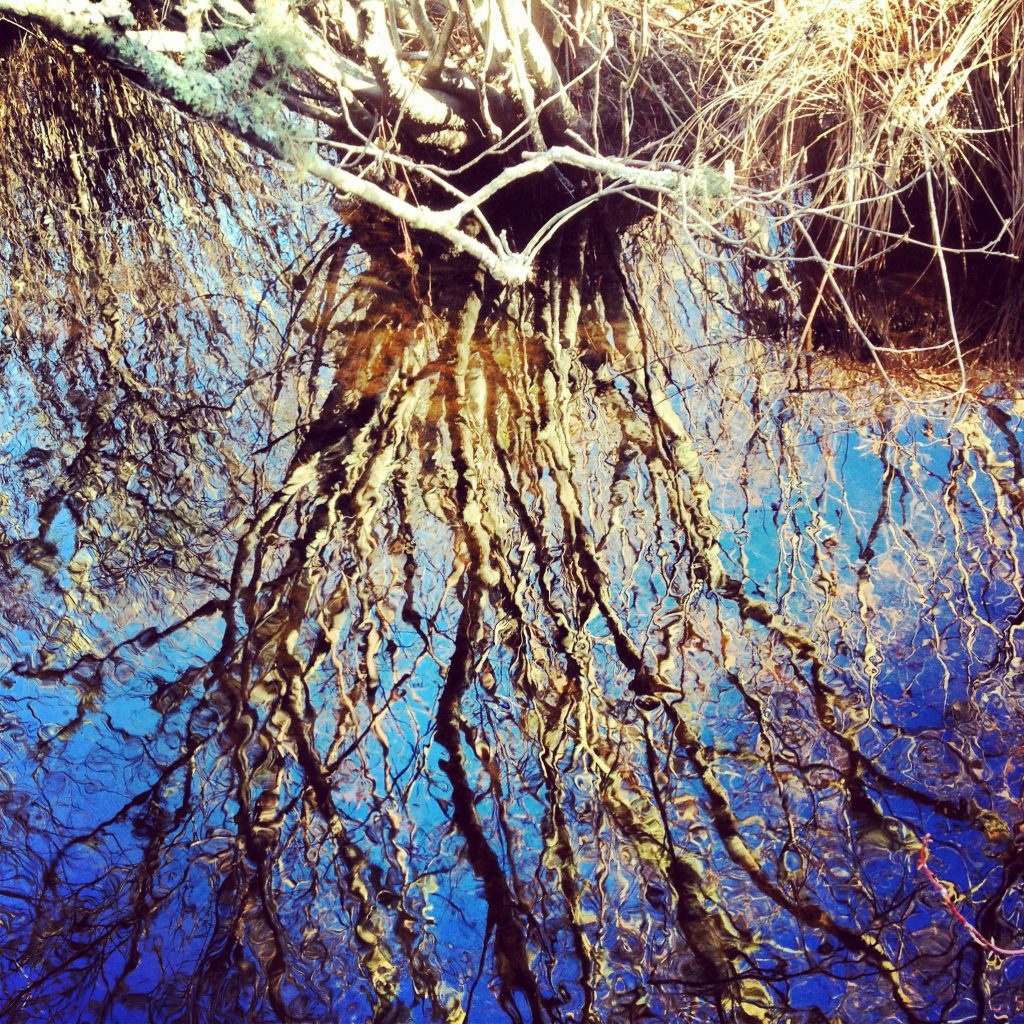
That February was cold and clear, a month of little snow and many blue-sky days. The year was 2008; I was thirteen months sober. I had taken the last ferry on the last Friday in January from the mainland to the Island in an act of bravery or insanity or cruelty, depending on what story I tell myself now.
Officially I needed a rest; unofficially I needed a month or two away from my husband — space and time and water between us. But there was nothing official or unofficial about the way I felt: sad, scared, and completely confused about who Susie was. Early sobriety had made one thing clear: I wasn’t who I thought I was. But who was I?
The crossing was a bit rough that Friday night. The boat lumbered through the swells, rolling slowly from side to side while I holed up in my red Honda, packed to the gills with books and whatnots and a Raggedy Ann, crying my eyes out, wondering what I had done.
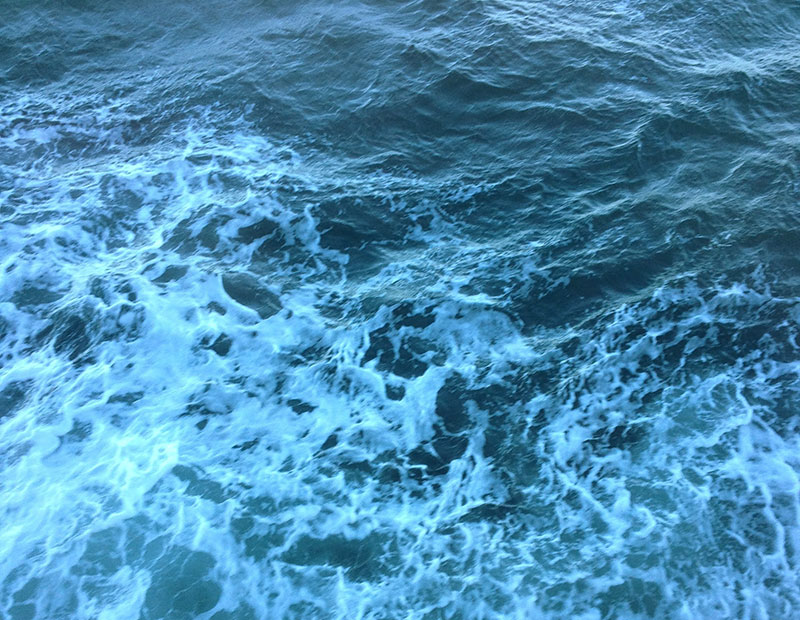
From the ferry landing in Vineyard Haven, I made my way to Oak Bluffs along dark roads I’d never driven to a rental I’d never seen, but for a small photo on the internet. I was to let myself in; there would be no key. Once there, inside the cozy cottage furnished with comfortable old furniture, I was relieved. I unpacked. I tucked myself into a strange bed up the loft stairs under the eaves, and wondered, now what?
In the morning, I drove to Lambert’s Cove beach, where I’d once been taken by friends on a visit to Martha’s Vineyard years before. I remembered the name, and fumbled with my folding map to find it. There I found a sandy path strewn with pine needles leading up and over an impressive range of dunes and down to a pretty shoreline stretching this way and that, the sparkle of sunlight on the water forcing me to squint for focus.
Without warning I began to cry again. There was nothing I could do but walk and walk, stooping for shells and rocks, tracing the trail of foam left behind by spent waves returning to wherever they came from. Water. Walking. Brilliant sunshine. I felt better.
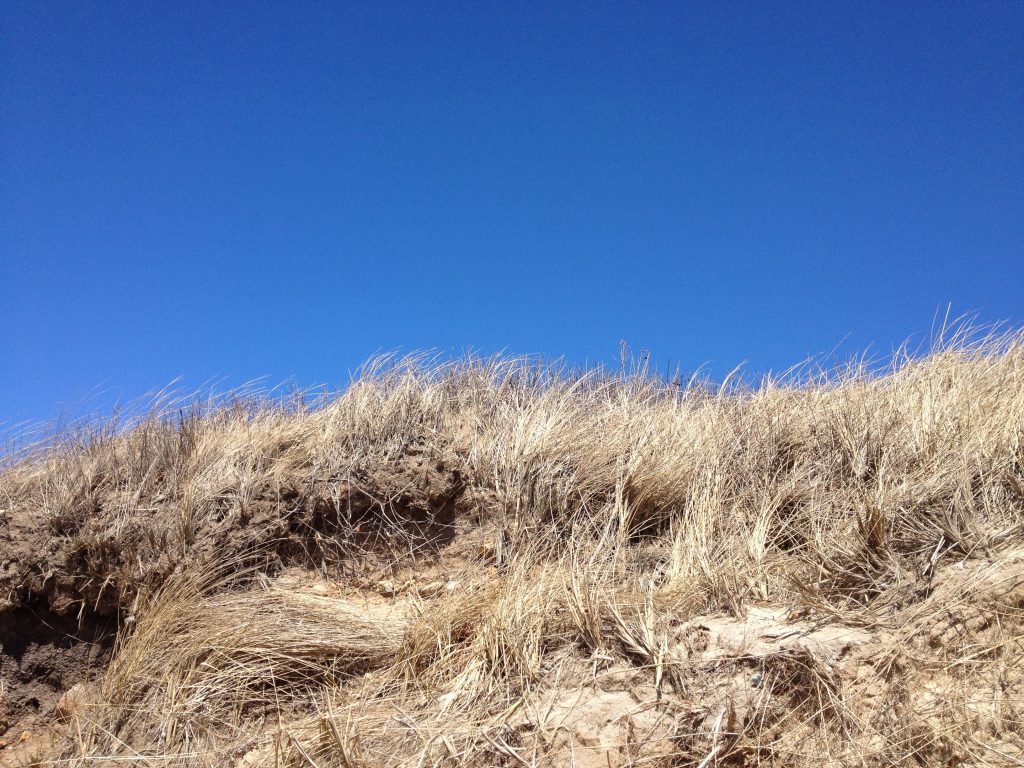
The next day I ventured further “up” Island thanks to my crumpled map. I parked at the trailhead of Menemsha Hills Reservation and began walking through the woods. This was not the beach, nor was it familiar terrain. I was leery of this strange world of twisted trees, bare-limbed and wallpapered with lichen. It seemed as if they were in an active battle with the elements and that they might come alive to skirmish at any minute.
I followed the path, at times a staircase of thick knobby tree roots, at times a black ribbon of dirt composted from ages of decay, uphill, left and right, right and left, finally taking a short spur to a clearing and a lookout, where Vineyard Sound lay blazing blue below me, the ellipses of the Elizabeth Islands punctuating the horizon.
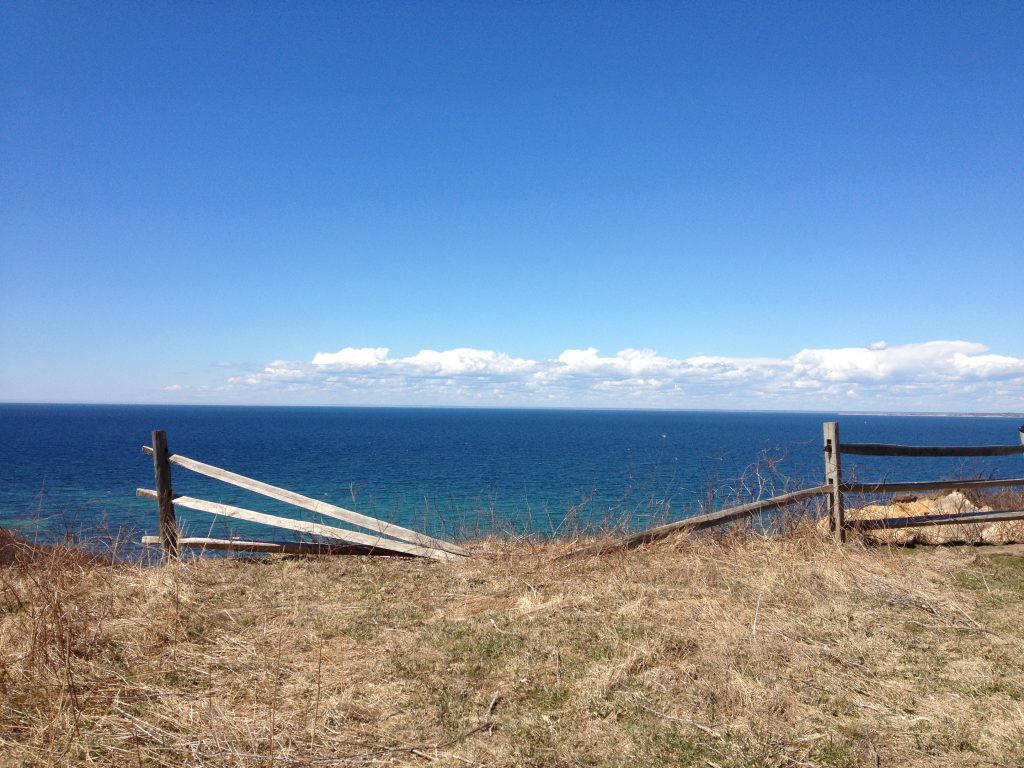
Back on the path, I found myself descending through thicker, mossier, messier growth, over the occasional crumbling stone wall and certainly, I thought, on a journey to the bottom of the world. Or at least Middle Earth. The path got steeper and sandier and harder to navigate. When would I get to the end? How much further did I have to go? When would the water come back into view? This was scary. Very scary. Yet also very beautiful. And very quiet. I thought to turn back but I pushed on. At last, my reward was a rocky beach at the bottom of a rickety wooden staircase. If one wanted to be alone with oneself, this was, without doubt, the place to do it.
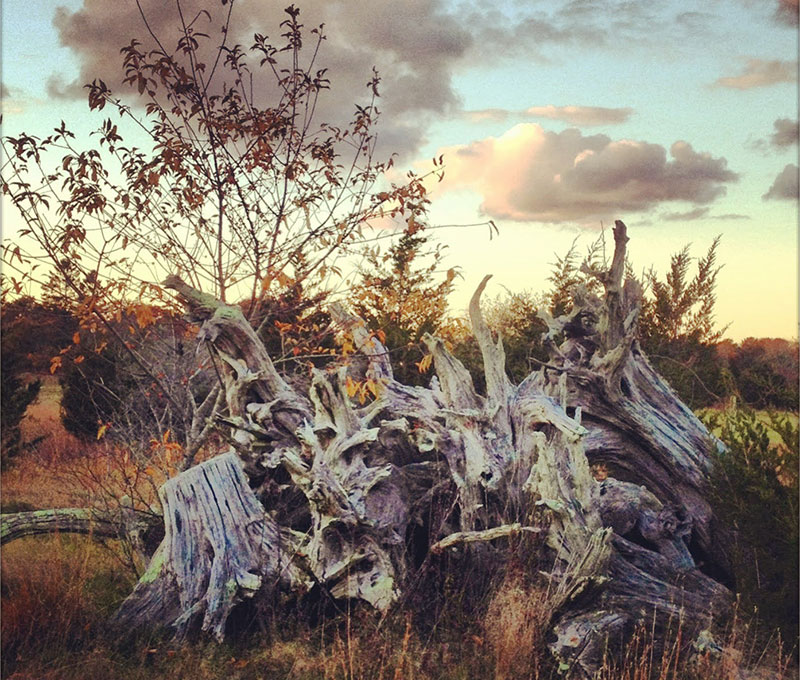
The walking went on like this for days, over wind-scraped dunes pricked with bayberry and beach plum, along rocky, sandy paths pocked by deer hooves and rabbit paws, into the deepest part of the thickest woods. I rubbed up against my fear, exposed my vulnerability, stripped down the layers of veneer that had built up between me and the natural world during too many years in an office, in the suburbs, in somebody else’s shoes.
In the woods, where I feared the wild things were, I discovered that the fear was inside me all along. I felt self-conscious and uncomfortable at first, but it was almost as if a powerful spirit surrounded me when I was completely exposed to the wind and the sun and the whispers in the woods. It was like becoming a part of something bigger while becoming smaller at the same time, and feeling good about that.
I am still walking, thirteen years later. Still on this Island. Still heading out every day during this pandemic to expose myself to the healing power of nature. It is a lifesaver.
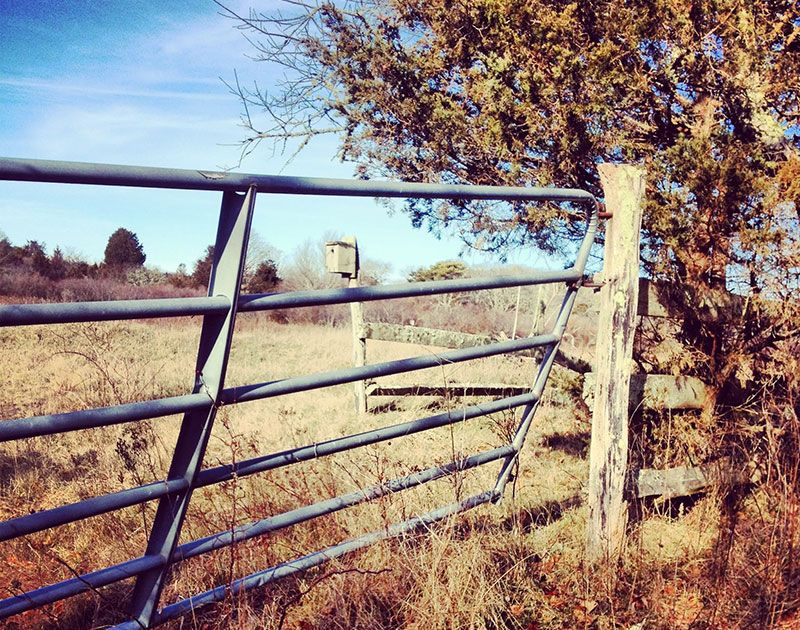
AND YET only this week have I learned what might lie at the root of this drive to inhabit nature. A friend sent me this interview with British naturalist Michael McCarthy (author of The Moth Snowstorm: Nature and Joy), who, in an effort to persuade us to find joy in the natural world, has written:
“The sudden passionate happiness which the natural world can occasionally trigger in us may well be the most serious business of all.”
Among other illuminations, he cites an idea that comes from a field of study called evolutionary psychology which posits that we have a deep affinity for the wild held over from our ancient selves:
“The core perception of evolutionary psychology is that the 50,000 generations that preceded us in the Pleistocene, which is the age of the Ice Ages, when we became what we are as part of the natural world — when we were wildlife, if you like — that those generations are more important for our psyches, even now, than the 500 generations of civilization which have followed the invention of farming about 12,000 years ago. So that there is a legacy deep within us, a legacy of instinct, a legacy of inherited feelings, which may lie very deep in the tissues — it may lie underneath all the parts of civilization which we are so familiar with on a daily basis, but it has not gone; that we might have left the natural world, most of us, but the natural world has not left us.”
McCarthy goes on to suggest that, “the natural world is a part of us, and that if we lose it, we cannot be fully who we are.”
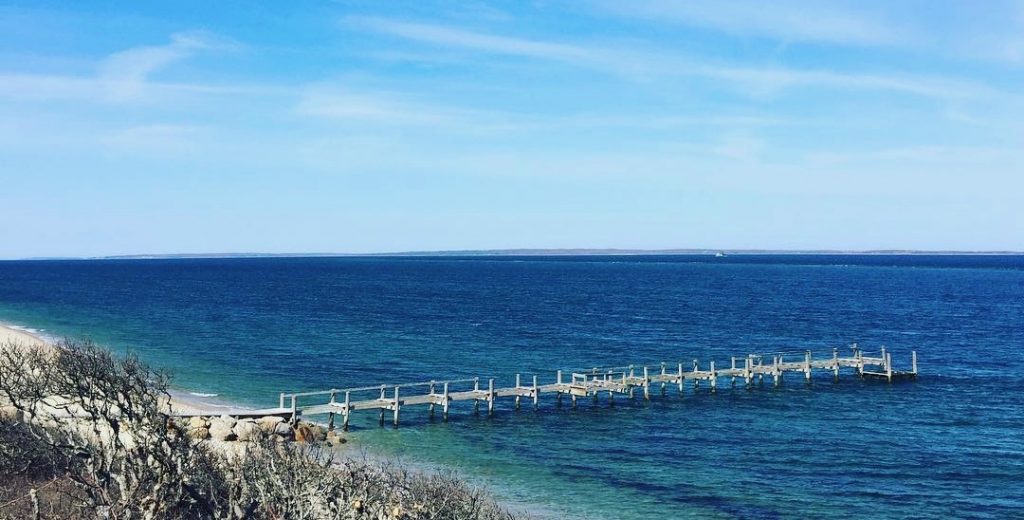
That’s a good place to stop and offer you further inspiration for finding joy (and perhaps a part of yourself) in nature:
Why I Wake Early: New Poems, Mary Oliver
A Timbered Choir: The Sabbath Poems, Wendell Berry
Deep in the Green: An Exploration of Country Pleasures, Anne Raver
The Rural Life and More Scenes From the Rural Life, Verlyn Klinkenborg.
P.S. Thank you to all of you who continue to email and comment on the blog since the reboot! So nice to be reconnected. If you feel comfortable, I encourage you to post your thoughts in the comments section under this blog post, so that we can share conversations with each other.
LOOKING FOR NEW RECIPES?
Visit cookthevineyard.com and sign up for the free weekly newsletter. (Something I do as part of my day job.)
